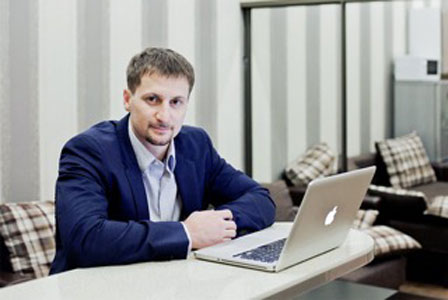
Vladimir Kovin is the founding partner of the Overcome The Barrier project, and the creator of the OCTB Method. He graduated from Coastal Carolina University in the United States, and he majored in accounting and finance. Afterwards, he worked as a financial analyst at Goldman Sachs and Citibank in New York and in Moscow. Additionally, he received a professional CPA certification.
Overcome the Barrier teaches English online to individual and corporate clients using a unique method. They use either Skype or GChat video conferencing to contact their clients while their teachers’ type everything being said by their clients during the lesson in Google Docs. Their students communicate with native English speakers, simulating the experience of living in an English-speaking country for the students.
All their clients have the ability to see what they have said in their lessons, which enables them to use their visual memory in order to focus on their individual mistakes denoted by their teachers in Google Docs, thus extending the learning process beyond the lesson. What differentiates this service is the physical record of each lesson, thus allowing the company to provide this service to its employees to monitor each and every employee's progress.
I was very fortunate to chat to him. I hope you enjoy his interview as much as I did.
Sunita
Sunita Sehmi: When and where did it all begin for you?
Vladimir Kovin: After getting laid off first from Goldman Sachs (NY) and later Citi (Moscow) in 2008 and 2009, I was forced to search for alternative sources of income for my family. I was in Moscow, Russia, but I had spent many years living in the United States and learning English. Thus, even though I had no prior experience in teaching languages, I decided to begin teaching English. So, I found some clients online. During my first class I started typing everything they said during the classes in Excel, the one tool for which I was trained to use. After just three months, my first client jumped staggering two levels thanks to the visualization provided by this new method. Soon I realized that I could scale my idea by turning to online tools (Google Docs and Skype) and hiring teachers all around the world. After attracting an angel investor and introducing lesson metrics (e.g. the error percentage of grammar mistakes per lesson), we reached an active client base of about 10 multinational companies with over 200 active learners and 100s more satisfied customers.
Sunita Sehmi: What is OCTB about?
Vladimir Kovin: We are a U.S.-based online language training company. Since 2008, we have provided services to both individual consumers and major companies in Russia, Japan, Mexico, Guatemala, Brazil and Chile. What makes Overcome the Barrier (OCTB) unique is the training method that we employ. Firstly, all training is held online, which allows our clients to receive language training wherever and whenever they feel most comfortable. Secondly, our method requires the clients to speak, regardless of their language level. Thirdly, as they speak, our trainers type every word they say in a shared document that updates in real time for both the trainer and the client. Finally, the trainer corrects the client's mistakes vocally and textually, allowing the clients to not only hear all corrections to their speech, but also see the corrections. Therefore, they make progress faster than they would using other traditional methods. We also track their progress statistically and allow them to visualize it in charts and reports.
Sunita Sehmi: What is so different about OCTB?
Vladimir Kovin: We provide "peace of mind" to the party that's ultimately paying for the language training, be it the company providing this service to its employee or the parent paying for his/her child's education. For years the major players in this industry were selling "air", when the learner hasn't reached the goals, the language training provider simply pointed the finger at the learner and blamed him for not attending, not doing homework and lacking the motivation. We've decided to put an end to this by providing lesson-by-lesson progress reports based on the actual results taken from the lesson. These "graphs" provide the companies the ability to see the trends before it's too late, when the money has been already spent and there are no results that were measured based on the traditional approach of testing the learner at the beginning and at the end of the course. These trends could then be used to bring learner's attention and enhance motivation. They also allow us to provide the highest quality control in the industry, because we can now drill down into each lesson to make sure adequate content and consistent correction process.
Sunita Sehmi: How can your service add value to companies?
Vladimir Kovin: Multinational companies or local companies with aspirations to go global have to establish clear channels of communication internally and externally. The consensus is to do it in English, however finding employees locally with technical skills and adequate level of English skills is not always easy. Most of the time the companies will compromise and hire the employees with technical skills only and hope that they'll develop language skills at some point. Once the employee is already hired, it's hard for him to find the motivation, time and energy to learn another language. We offer a service that will help them do it faster, while providing the transparent and measurable results, which in turn provides predictable Return on Investment. In the end we help companies to stay within the budgets or even reduce the costs associated with getting their employees to communicate and understand internal and external partners clearly.
Sunita Sehmi: Why is it so important to learn languages?
Vladimir Kovin: In today's world that is becoming more and more global, and the innovation that could spur from any part of the world, the companies in order to maintain their competitive edge have to get their employees instantly react to these changes. By hiring employees that are complacent the companies risk losing to the competition. The same reality applies to individuals, we are living in a very competitive world and you can lose a job to a person who has the same or higher technical skills and speaks your language, while living and working from a much cheaper geographical location. The work environment transitions online more and more, and you can perform this work virtually from anywhere on the planet. So if you have the skillset and you can earn more money while continue to live in your home country, the only thing that might be stopping you is the adequate language skills. And for the companies that means that they can reduce their payroll expense by tapping into this new labor force.
Sunita Sehmi: Why are people struggling with language learning?
Vladimir Kovin: Learning a language is a very difficult task, because what it ultimately means is to start thinking in another language, this is a monumental task. Our brains continue to translate a word to our native tongue even after learning a foreign language for a while. By the time you finished translating one word, the speaker already said 20 or 50 other words, and this why it's frustrating, I find this to be the most difficult part of learning a foreign language, because you not only have to know the words that you want to say, but all the words that are spoken to you. However, most of the people struggle with the ability to speak, they put a certain limitation on themselves, being shy, being scared to speak and create this nervousness that paralyzes them.
Sunita Sehmi: All the literature tells us to keep learning but how can we fit it all in with the pressure of professional and personal commitments?
Vladimir Kovin: You have to keep learning, because if you do it enough, your brain all of the sudden, almost magically gets tired of translating, like a switch of a button and you become fluent. Finding the time is part of the problem; the bigger problem is to find the motivation to force yourself to do it, after completing all the commitments in personal and professional life. You just want to relax, watch a TV show, a sports game. So what we offer is the constant reinforcement and ability to see your progress. It takes a very long time to learn a language and at times you feel like you are stuck and not improving.
Sunita Sehmi: Could you share some of your strategies that we could use to keep learning?
Vladimir Kovin: We offer lesson-by-lesson progress reports that not only show the progress made on a lesson-by-lesson basis to a learner and a company, hence ensuring the continuation of the learning process, but also help us to create an industry-leading quality control analysis tool. By looking at these numbers we can quickly identify the problem areas, make sure the teachers use appropriate content, to make the lessons interesting and relevant to the learner and the company. We also take away the option to point a finger at the end of the course, from a teacher to a learner and in reverse. We provide our service online, which provides the ability for the student to reschedule classes just a few hours before the lessons, which ensures consistent attendance by allowing the learner to study from anywhere, be it vacation, business trip, home or office.
Sunita Sehmi: What’s the next challenge for us? What's next for you?
Vladimir Kovin: The next challenge for us is to transition from the best language learning company during the lesson, to the best one between the lessons. Right now we are able to measure the performance based on the actual numbers during the lessons, and have limited capability to measure the work done between the lessons. We are currently working on a state of the art platform that would allow to measure how much of the information from the lesson was retained, use artificial intelligence to push the learner towards doing more exercises with mistakes that he has made and offer an ability to learn passively outside of the classroom. We will also provide an ability to do it via a mobile device, hence allowing people to continue studying during the times away from the computer.
For more information check out their website, OTB: http://www.octb.us/
Bio

Sunita is an Executive Coach, Trainer and Consultant. She is of Indian origin and was born in London before moving to Geneva in 1992. She has a Psychology background (specialising in Occupational Psychology) and a Post Graduate in the Development and Training of Adults. She also completed a Masters in Ressources Humaines, Coaching et Gestion des Carrières at the University of Geneva.
During her 25 years experience Sunita's drive has always been to help people to do their best and hence led her to create Walk The Talk.
In her free time Sunita is a Mentor for the Branson Center of Entrepreneurship and a proud member of the School in The Cloud Team.






